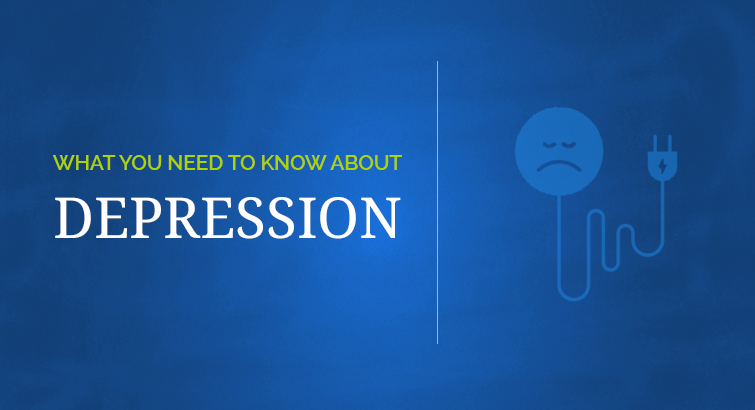|
Mental Health is a prevalent, yet often neglected topic within our society. Heal Guyana is consistently making efforts to spread awareness of these issues; and given that 1 in 4 people around the world will develop a mental illness, justifies why this continues to be a major issue for us here in Guyana. Today, I wanted to talk about the most prevalent form of mental illness -- depression. "I feel depressed" or "you look depressed" are commonly heard around Guyana. However, I do not think that people understand the seriousness or depth of this illness. There are many different types of depression but today I will focus on ‘General Major Depressive Disorder’ which can be mild, moderate or severe. Depression is the most common mental illness worldwide. It is often compared to emotional sadness, as that is what the afflicted feel. Being sad is a normal and even healthy emotion. We all do similar things when we are sad – we have low moods, we cry or stay in bed all day. This is normal for a day or two after an unpleasant experience. However, if the feeling, as well as the symptoms, persist, it is possible that it has developed into depression. Therefore, depression is prolonged and severe sadness that interrupts daily life. The World Health Organisation has determined that 1 in 5 individuals will experience depression. Studies show that it is more common in women among men but there are many limitations to such studies. For example, women are more likely to speak about personal mental health issues as well as seek help. This leads me to believe that it is very possible, if not likely, that men equally suffer from depression. Depression can cause a variety of physical, behavioral and emotional issues. Yes, depression physically hurts and can manifest through aches and pains such as head and stomach aches. Typically, there are serious disruptions in eating and sleeping patterns (either too much or too little), isolation, sexual dysfunction and persistent crying which results in an overall lack of energy. There is low concentration and motivation while feeling constant irritation or aggravation. Most people experience low mood, loss of interest in previously enjoyed activities as well as feelings of hopelessness and helplessness. This results in a dramatic decrease in self-esteem and overall self-worth which tends to promote the onset or continuous use of alcohol and other drugs. Most people with depression will self-harm and have suicidal thoughts, sooner or later leading to an attempt. If you regularly experience 4 or more of these symptoms over a period of two or more weeks, I would suggest speaking to your doctor as depression without proper treatment can disrupt every aspect of your life. Although a family history of depression makes you more vulnerable, absolutely anyone can develop depression. There are many causes for the onset of depression that can be physical, psychological or environmental. This means that there is no one cause of depression. Those with a chronic physical illness such as diabetes, cancer, heart disease or any kind of physical disability are more likely to suffer from depression. Those with an already existing mental illness such as addiction (especially alcohol or marijuana) or anxiety are also more at risk. Those who suffered traumatic experiences such as the death of a loved one, divorce, loneliness, any kind of abuse, consistent unemployment, etc. have a higher chance of developing depression. Studies also show that people who live unhealthy lives such as not eating well, not sleeping well or not exercising are more likely to suffer from depression. Depression is not curable but can certainly be treated, allowing those afflicted to still lead healthy and happy lives. The proper treatment will depend on the diagnosis, as people with different variations (mild, moderate or severe) may not require the same plan of action. People with mild to moderate depression can improve based on simple lifestyle changes. This includes changes in sleeping patterns, diet, exercise routines as well as adopting new and healthier coping skills. However, it is still advised that you see your doctor before making a plan. The best course of treatment for severe depression is a mixture of healthy lifestyle changes, counselling and most of the time, prescription medication. Please do not take medication that is not prescribed as even if you have the same symptoms as someone else, it does not mean that the same medication is right for you. The mixture of all these strategies is known as a combination therapy -- the most successful type. Counselling can be individual or family counselling that help people get to the source of their depression; as well as how to deal with it. The most common mistake that people make while on medication is that they stop taking it the moment they start to feel better. It is important to remember that you are starting to feel better because of the medication and should not stop the treatment course unless medically advised. With combination therapy, individuals start to see results and improvements between three to six months. Some people take longer and that is absolutely okay – it does not mean you will not get better in general. While many of the risk factors of depression are uncontrollable, there are things that we can do to make the onset less likely: First and foremost, if you start to feel like you may be at risk, ensure that you speak to someone you trust the moment you start to feel this way. Depression is too common for people to still be ashamed of their feelings. Live as healthy as possible. There is a common saying (which I completely agree with) -- “healthy body, healthy mind”. Eat and sleep well while getting exercise at least three times per week. Spend more time outside to get good vitamin D. Practice healthy coping skills when you are upset (or not). Don't over-use depressant drugs such as alcohol or marijuana as these have been shown to increase the risk of depression. Many believe that depression is not a real illness or that it is only for the weak. We are here to explain how serious it is, and we encourage you to be cognizant of its symptoms. You cannot just “get it together”. With proper, ongoing treatment, you can live a happy and healthy life.
0 Comments
|
About Us:Heal Guyana is a registered, not-for-profit organisation which functions as a civil society platform that focuses on empowering Guyanese and influencing citizens toward positive behavior change. Disclaimer:The views expressed herein are those of the Author; they do not necessarily reflect the views of Heal Guyana or its Executives. |




